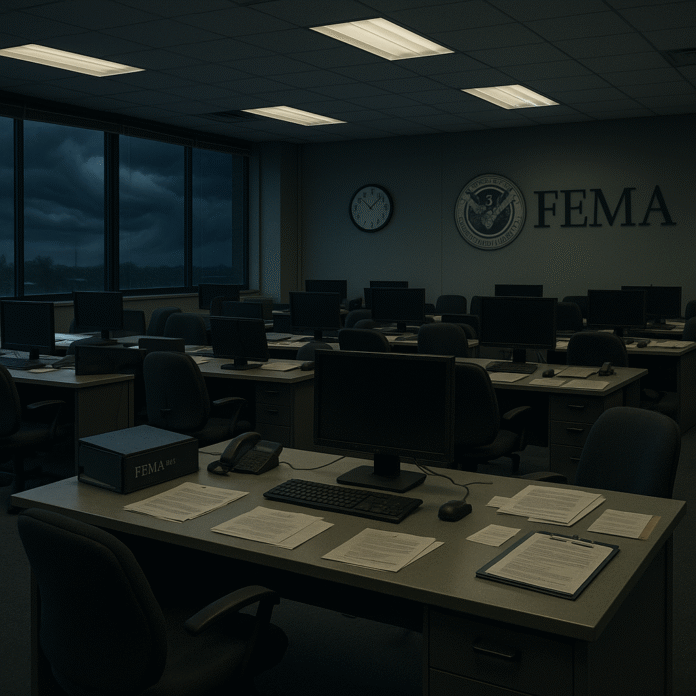FEMA Faces Hurricane Season Unprepared, Internal Review Warns
Staff shortages, shifting priorities, and political pressure leave FEMA scrambling as hurricane season looms.
The Federal Emergency Management Agency (FEMA) is not ready for the 2025 hurricane season, according to a recent internal review. With the official start of hurricane season just weeks away, the agency is grappling with staff cuts, unclear direction, and mounting political pressure. This troubling assessment comes at a time when experts predict an above-normal hurricane season, raising urgent questions about the nation’s disaster readiness and the safety of millions of Americans.
FEMA’s Readiness in Question
Internal Review Raises Red Flags
A confidential FEMA presentation, obtained by multiple news outlets, reveals that the agency’s preparations for the 2025 hurricane season have “slowed to a crawl.” The review, ordered by new acting administrator David Richardson, highlights a need for FEMA to “refocus on its core mission while preparing for the 2025 Hurricane Season” CBS News.
One slide from the internal document states bluntly:
“As FEMA transforms to a smaller footprint, the intent for this hurricane season is not well understood, thus FEMA is not ready.”
The review points to several key issues:
- Staffing shortages due to recent layoffs and contract changes
- Disrupted coordination with state and local agencies
- Uncertainty about FEMA’s evolving mission under new leadership
- Low morale among remaining staff
Political Shifts and Leadership Changes
The agency’s struggles are compounded by political upheaval. President Trump has openly criticized FEMA’s past performance and has floated the idea of eliminating the agency or transforming it into a support role for states. In line with this vision, hundreds of probationary FEMA employees were laid off earlier this year, and many others are now required to reapply for their positions through the Department of Homeland Security (DHS) ABC News.
David Richardson, a former Marine and DHS official, was installed as acting administrator after his predecessor was fired for opposing the agency’s downsizing. In his first all-hands meeting, Richardson made his priorities clear:
“Don’t get in my way… I will run right over you,” he told staff, emphasizing his commitment to carrying out the president’s agenda.
The Human Cost of Unpreparedness
What’s at Stake This Hurricane Season?
The 2025 Atlantic hurricane season is expected to be especially active, with forecasts calling for 17 named storms, nine hurricanes, and four major hurricanes Axios. For communities along the Gulf and Atlantic coasts, FEMA’s readiness is not just a bureaucratic concern—it’s a matter of life and death.
When disaster strikes, FEMA is responsible for coordinating federal response, providing emergency shelter, and distributing aid. Delays or missteps can mean the difference between swift recovery and prolonged suffering.
Staff and State Concerns
FEMA’s internal review also notes a growing perception that state officials are “passing the buck” to the federal agency, even as the administration pushes for states to take on more responsibility. During a recent town hall, Richardson cited California and Texas as examples of states capable of handling their own disasters. This comment drew skepticism from staff who remember the deadly Texas winter storm of 2021, when state resources were quickly overwhelmed.
A longtime FEMA employee, speaking anonymously, said:
“We’re being told to do more with less, but disasters don’t wait for us to catch up. People’s lives are on the line.”
Political Debate: Federal vs. State Responsibility
The Push to Shrink FEMA
The Trump administration’s plan to reduce FEMA’s role is part of a broader effort to shift disaster response to the states. Supporters argue that local officials are better positioned to understand and address their communities’ needs. Critics warn that many states lack the resources or expertise to manage large-scale disasters on their own.
Richardson, echoing the administration’s stance, told staff:
“The president’s intent for FEMA is to ensure that FEMA is only doing the things in law that it should be doing… There is a large push to get resources to the states.”
Counterarguments and Concerns
While some states have robust emergency management systems, others rely heavily on federal support. The internal review warns that “culture issues,” hiring freezes, and a lack of coordination could leave gaps in disaster response. As one FEMA official put it, “Even the best state plans can be overwhelmed by a major hurricane. That’s why FEMA exists.”
What Needs to Change?
Recommendations from the Review
The internal review calls for FEMA to:
- Refocus on its core mission of disaster response
- Improve coordination with state and local agencies
- Address staffing shortages and morale issues
- Clarify its evolving role under new leadership
The Path Forward
Acting Administrator Richardson has promised to close the gaps in FEMA’s hurricane plan, stating, “We will do our best to make sure that the plan is all-encompassing.” However, he also acknowledged that “a plan never survives first contact” with a real disaster.
A DHS spokesperson pushed back on the internal review’s findings, calling them “grossly out of context” and insisting that FEMA is “fully activated in preparation for Hurricane Season.” Still, the agency’s own staff and independent experts remain concerned.
Why This Matters for Every American
The Bigger Picture
Disasters don’t respect state lines or political agendas. When hurricanes hit, Americans expect a coordinated, effective response—regardless of who is in charge. FEMA’s current struggles highlight the risks of underfunding and politicizing disaster relief.
As the 2025 hurricane season approaches, the nation faces a critical test. Will FEMA and its partners be ready to protect lives and property? Or will bureaucratic delays and political infighting leave communities vulnerable?
What You Can Do
Stay informed about your local emergency plans. Advocate for strong disaster preparedness at every level of government. And most importantly, demand accountability from leaders who are responsible for keeping us safe.
Have thoughts on FEMA’s readiness or your own community’s disaster plans? Leave a comment below and share this article with friends. Your voice matters.



